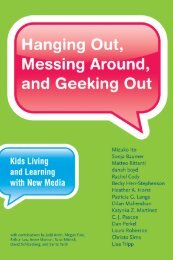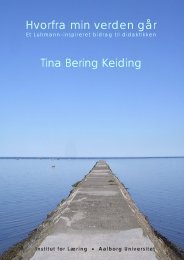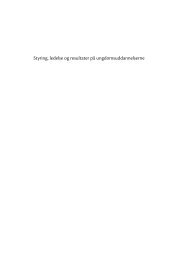T. Kurbanowdictionaries, word lists; thesaurus); text editors and word processors for writing texts;calendars; media players (for streaming audio and video, and for creating podcasts);academic search engines, databases, Internet public libraries and archives (GoogleScholar, Microsoft Academic Search, the British Library Catalogue); search enginesfor reading social media (Technorati, Google Blog Search, WhosTalking); services anddevices for content storage (hard drives, virtual discs; the system of online bookmarks);educational games; online quizzes; tools for creation of presentations (Power-Point, Prezi); content management systems for creating web sites; services for contentand video sharing (SlideShare, Flickr, Google Photos; YouTube; BlipTV); online mapsand GPS; newsreaders.Students will not necessarily adapt each of the tools available, but will choose mostappropriate from their personal point of view. Yet, technology is not the target in itself.It is not the number of services and tools the learner incorporates in his/ her PLE thatdetermines its value, but the benefits the learner manages to take from the technologyin order to enhance own learning. Students learn not due to the technology, but throughthe technology (Drexler 2010 b).Alec Couros (2010, p. 125) differentiates between Personal Learning Environmentand Personal Learning Network, which he defines as “the sum of all social capital andconnections that result in the development and facilitation of a personal learning environment”.The value of online learning communities is immense. While in the traditionalclassroom settings there is a possibility only for a limited number of viewpoints(the author's of the textbook, the teacher's, perhaps that of a number of co-students),PLN expands to include co-learners, educators, theorists, and profile experts from otherinstitutions, educational systems, countries to give the learner a more diverse perspectiveof the problem under study (ibid.; Drexler 2010 a). The external learning communitieshave an advantage before course-based communities, since the former unite usersby intrinsic educational interest, and not by a particular course the learners are taking atthe moment. Hence, the learners are likely to remain in the community much longer,than duration of an academic course, continuing their self-initiated learning (Couros2010).Interest-based communities, which users join with the aim of socializing on topicsof interest, should be differentiated from online learning communities, which unitepeople by the common aim to study. While the latter is a constituent of the PLE, theformer can be considered as such only if the discussion contributes considerably to theuser's knowledge expansion in a particular field of knowledge.PLE becomes a student’s individual virtual learning space, and at the same time ashared space for academic communication, with the knowledge placed in multiplenodes which the learner can re-visit, activate, extend, or change at any time in future.In case the learner chooses to abandon the old PLE, if created as an open resource, itstill remains a strong node from which others can learn (Drexler 2010 a).65
Personal learning environments of polish academic participantsOnce familiar with the strategies how to construct PLE for investigation of a particularlearning task, learners are equipped with necessary knowledge and practical skillshow to do it in future beyond the classroom walls, and can apply the previous frameworkto investigate any other learning problem, this time independently. This way, theeducational establishments can prepare future graduates for after-university lifelonglearning (Attwell 2007; Couros 2010; Drexler 2010 a).3. The interview concerning creating and using PLEs by Polishacademic participants: description.Inspired by the numerous advantages Personal Learning Environment offers learners,I wanted to investigate if Polish academic participants realize its benefits and use itin their formal and/or informal learning and work. The general goal of my pilot studywas to discover how students and academic teachers construct, maintain, and use theirPLEs: a) to analyze how students and teachers collect and implement in their formal/informal learning and academic work Internet resources (OER or others); b) to analyzehow students and teachers use Internet for professional communication; c) to analyzehow students and teachers contribute to creation of online digital content and share itwith co-students/ co-teachers.Respondents. The pilot study involved a total of 18 respondents (11 students (61%)and 7 academic teachers (39%)) who voluntarily agreed to participate in the interviewsurvey.The student-respondents were enrolled in various subject areas of formal educationalprogrammers: 5 students (45%) studied Engineering, 3 students (27%) studied Medicine,2 students (18%) were enrolled in the Education Studies, and 1 – in Law Studies(9%). The vast majority of the student-respondents studied at the day department anddid not work (8 people, 73%); 2 student-respondents (18%) studied at the extra-muraldepartment and were additionally employed part-time; 1 student-respondent (9%) studiedon the individual education plan and was additionally employed full-time. 7 student-respondents(64%) were the 1st-year students; 2 student-respondents (18%) wereon their final year of Bachelor's or equivalent programme; 2 student-respondents (18%)were on their final year of Master's programme. All came from the Polish educationalsystem.The prevailing majority of the teacher-respondents were the academic teachers ofForeign Languages (5 people, 72%); 1 was the academic teacher of Chemistry (14%);and 1 – of Engineering (14%). All were employed full-time in higher educational establishments,with 5 respondents being in profession from 10 to 20 years (72%); and 2respondents being in profession from 5 to 10 years (28%). 5 teacher-respondents heldMaster's Degree or equivalent (72%) with 3 of them being additionally on PhD programmers(43% from the total of teacher-respondents); 2 teacher-respondents held66
- Page 2 and 3:
VIA UNIVERSITY COLLEGEDENMARKCREATI
- Page 4:
Table of contentIntroduction . . .
- Page 7 and 8:
the reader toward better perception
- Page 9 and 10:
Enhancing the Global Classroom for
- Page 11 and 12:
Enhancing the Global Classroom for
- Page 13 and 14:
Enhancing the Global Classroom for
- Page 15 and 16: Enhancing the Global Classroom for
- Page 17 and 18: Enhancing the Global Classroom for
- Page 19 and 20: Enhancing the Global Classroom for
- Page 21 and 22: Enhancing the Global Classroom for
- Page 23 and 24: Methodology of enterpreneurship tea
- Page 25 and 26: Methodology of enterpreneurship tea
- Page 27 and 28: Methodology of enterpreneurship tea
- Page 29 and 30: Methodology of enterpreneurship tea
- Page 31 and 32: Methodology of enterpreneurship tea
- Page 33 and 34: Methodology of enterpreneurship tea
- Page 35 and 36: Methodology of enterpreneurship tea
- Page 38 and 39: CREATING ENTREPRENEURIAL MINDSETCHA
- Page 40 and 41: A. Ziółkowski, K.Ziółkowskidedi
- Page 42 and 43: A. Ziółkowski, K.ZiółkowskiThe
- Page 44 and 45: A. Ziółkowski, K.ZiółkowskiFig.
- Page 46 and 47: A. Ziółkowski, K.ZiółkowskiFig
- Page 48: 9. ReferencesA. Ziółkowski, K.Zi
- Page 51 and 52: Design of a learning process for SM
- Page 53 and 54: Design of a learning process for SM
- Page 55 and 56: Design of a learning process for SM
- Page 57 and 58: Design of a learning process for SM
- Page 59 and 60: Design of a learning process for SM
- Page 62 and 63: CREATING ENTREPRENEURIAL MINDSETCHA
- Page 64 and 65: T. KurbanowOERs are Massive Open On
- Page 68 and 69: T. KurbanowDoctor's Degree (28%). 5
- Page 70 and 71: T. KurbanowFig. 3. Categorization o
- Page 72 and 73: T. KurbanowThe next question was re
- Page 74 and 75: T. KurbanowFig. 8. Services and sof
- Page 76 and 77: T. Kurbanownation may rest in the v
- Page 78 and 79: T. Kurbanow2. Britt A.M., & Gabrys
- Page 80 and 81: CREATING ENTREPRENEURIAL MINDSETCHA
- Page 82 and 83: V. Marcinovátime, tomorrow each pe
- Page 84 and 85: V. MarcinováIt is difficult to qua
- Page 86 and 87: V. Marcinovádevelopment. It is evi
- Page 88 and 89: V. Marcinováincreases the rate of
- Page 90 and 91: V. Marcinovámaking perspective. Hu
- Page 92 and 93: CREATING ENTREPRENEURIAL MINDSETCHA
- Page 94 and 95: J. Czerna-Grygielate an organizatio
- Page 96 and 97: J. Czerna-GrygielMillward Brown SMG
- Page 98 and 99: J. Czerna-GrygielEducation continui
- Page 100 and 101: J. Czerna-Grygielis the implementat
- Page 102 and 103: J. Czerna-GrygielResearch conducted
- Page 104 and 105: CREATING ENTREPRENEURIAL MINDSETCHA
- Page 106 and 107: H. KrukOther principles connected w
- Page 108 and 109: H. Kruk2014/2015 while some for pre
- Page 110 and 111: H. Krukin programmes in economics f
- Page 112 and 113: H. Krukplaces”, “Fuel and energ
- Page 114 and 115: H. Krukuniversities of technology a
- Page 116 and 117:
CREATING ENTREPRENEURIAL MINDSETCHA
- Page 118 and 119:
S.BadowskaWith this approach, resea
- Page 120 and 121:
4. Results and discussionS.Badowska
- Page 122 and 123:
S.Badowskaown professional interest
- Page 124 and 125:
S.BadowskaAn academics’ propensit
- Page 126 and 127:
S.Badowskaacademic staff will spend
- Page 128 and 129:
S.BadowskaSecondly, tested research
- Page 130 and 131:
S.Badowska13. Kruss G. (2012). Reco
- Page 132 and 133:
AbstractsAbstractsChapter 1. Bryan
- Page 134 and 135:
Abstractstransfer a certain body of
- Page 136 and 137:
Abstractsinclude courses concerning





